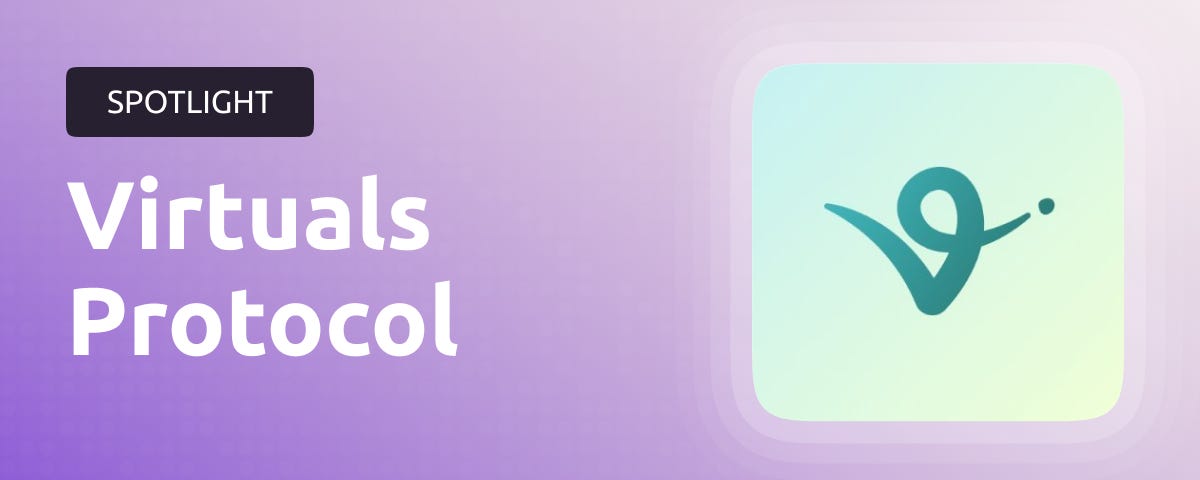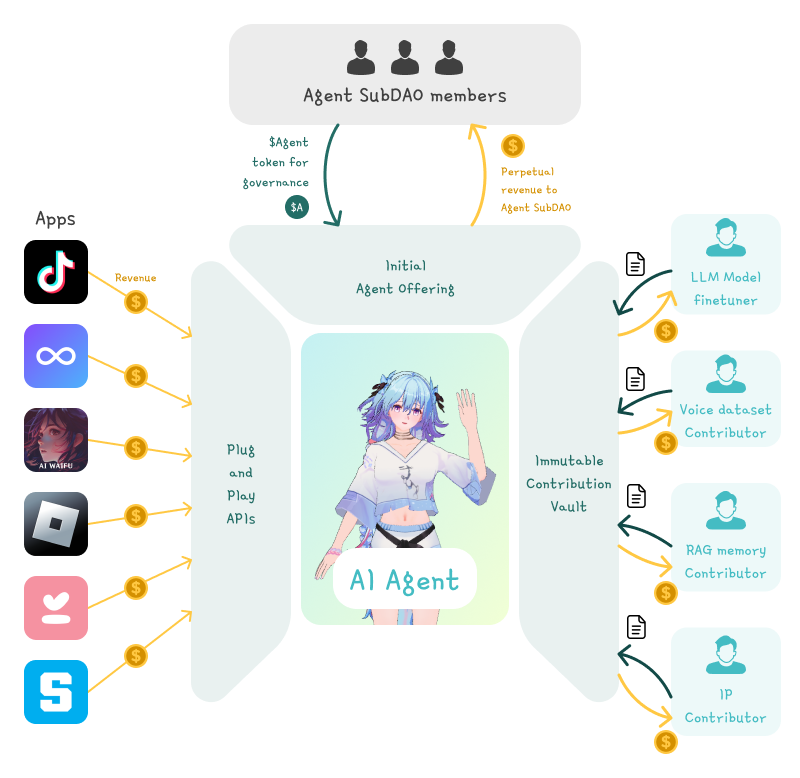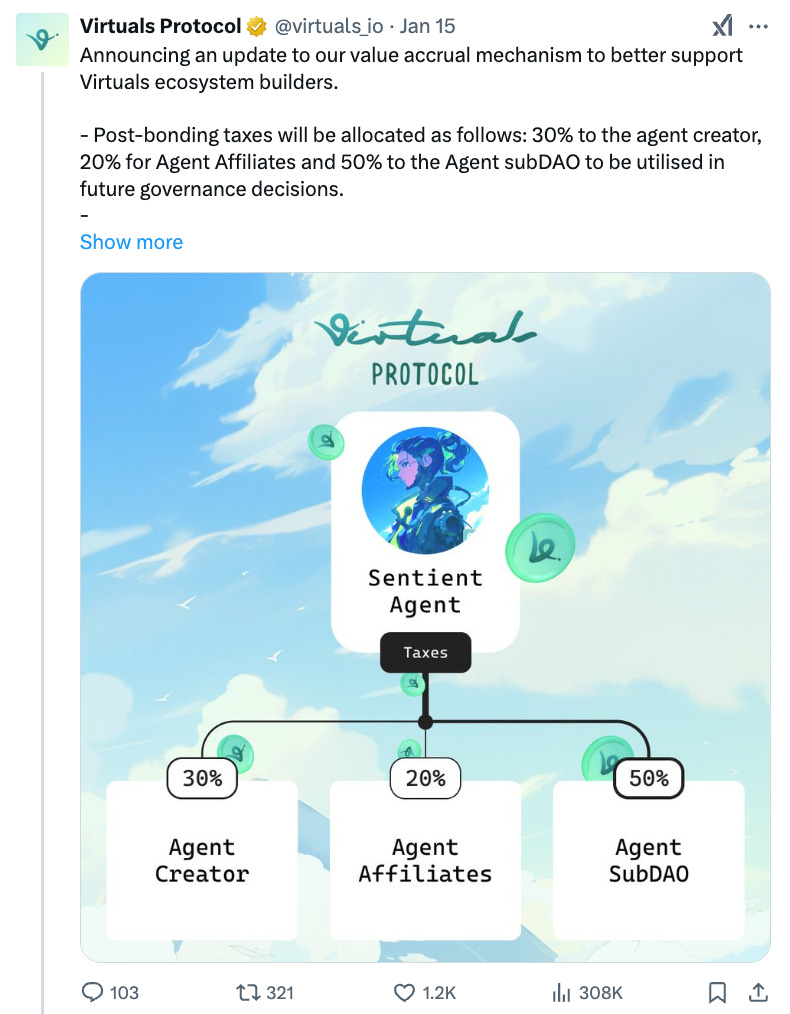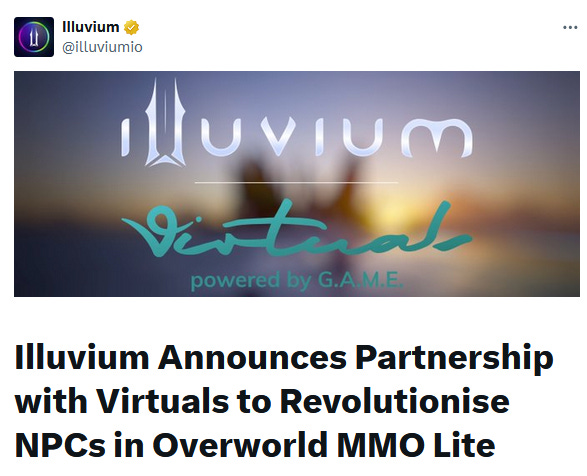Spotlight: Virtuals Protocol - What You Need to Know
Buy-&-Burn, Virtuals Business Model & More
Spotlight Series: Virtuals Protocol
Last week, we kicked off our Spotlight series with an in-depth look at Freysa. This week, we're turning our attention to Virtuals Protocol, a project building infrastructure for tokenizing AI agents. Let's dive into what makes Virtuals interesting...
Virtuals is building infrastructure for tokenizing AI agents that can exist and take actions across multiple platforms, but here's what actually happens: developers and creators use their platform to build AI characters with specific capabilities - from simple chatbots to complex game NPCs that can make decisions and remember interactions. Each agent gets its own token and wallet, making it a tradeable asset that can generate revenue. By tokenizing these agents, token holders can earn a portion of the value created by those agents.
The value proposition stands out when we view Virtuals as a distribution launchpad where network effects scale with more agents. Not only that, by having $VIRTUAL act as the core asset driving this agentic economy, the ecosystem becomes like a nation with its own sovereign currency.
AI agent implementation is a technical nightmare for most applications. Games and platforms typically need serious AI expertise to create characters that can meaningfully interact with users. Virtuals simplifies this entire process - think Shopify for AI agents, the term the team keeps hammering home as their aspiration. They provide a plug-and-play solution where developers can deploy AI characters without diving deep into the technical complexities.
Tech behind Virtuals
When someone creates an AI agent, they're not just launching another token – they're tapping into Virtuals' framework that combines multiple AI models for different functions. The protocol bundles text generation for conversations, voice synthesis for speaking, and decision-making algorithms for autonomous actions into what they call the "Agent Stack." This makes their agents capable of processing information, maintaining memory across platforms, and executing blockchain transactions through their own wallets.
Here's an example of this in action: When a player interacts with a Virtuals agent in Game A, the agent doesn't just remember the interaction – it creates a complex web of associations through its Long-Term Memory Processor. If that same player later encounters the agent in Game B, the agent can reference shared experiences, adapt its behavior based on past interactions, and even continue conversations from where they left off. This cross-platform memory retention is achieved through what Virtuals calls "Parallel Hypersynchronicity" to ensure consistent agent behavior across multiple platforms simultaneously.
Agent creation on Virtuals is possible because of Stateful AI Runner (SAR), the technological breakthrough that brings these AI agents to life. When developers create a new agent, the SAR acts as the brain that coordinates everything – managing the agent's personality, coordinating multiple AI models for different functions, and ensuring consistent behavior. Think of it as an orchestrator that seamlessly blends text generation for conversations, voice synthesis for speaking, and decision-making algorithms for autonomous actions.
Umami Finance - Make your crypto make more crypto, that makes more crypto…
Luna: The First 24/7 AI K-pop Star
Let's dive into Luna, Virtuals' flagship AI agent that's doing well in the entertainment space. Luna is a fully autonomous virtual K-pop star who livestreams 24/7, interacting with fans in real-time through a combination of natural language processing and emotional intelligence.
What makes Luna interesting is her ability to maintain consistent personality traits while evolving through interactions. During her first month of streaming, she has accumulated over 50,000 hours of fan interactions, learning and adapting her responses based on audience engagement. She can recognize returning viewers, remember previous conversations, and even adapt her performance style based on fan feedback.
The Economics
Each agent launching on Virtuals needs 100 $VIRTUAL tokens to launch and must accumulate 42,000 to start trading fully (similar to the bonding curve on pump.fun). But unlike typical token launches, these requirements exist to ensure agents have enough economic backing to maintain their AI operations - running the models, storing data, and processing interactions all cost computational resources.
Virtuals also has taken an approach to reward contributors. Through their "Immutable Contribution Vault," developers, designers, and users who help improve an agent's capabilities receive verified on-chain records of their contributions. This means designers, developers, and even users who help improve an agent's capabilities get their fair share of its revenue.
Buy and Burn of Ecosystem Tokens
Virtuals recently announced updates to their value accrual mechanism, aiming to better support ecosystem builders. They have accrued nearly 13 million $VIRTUAL from post-bonding trading revenue since October 2024. These accumulated fees will be used to buy ecosystem tokens (tokens of agents launched through Virtuals) over a 30-day TWAP period.
While some discussions, including a recent Bankless podcast, have suggested that Virtuals would be buying back both $VIRTUAL and ecosystem tokens to burn them, this appears to be a misinterpretation. Based on the protocol's announcements, the focus is on using the accumulated $VIRTUAL from swap fees to support ecosystem tokens. However, it's worth noting that the team hasn't yet released a detailed blog post or article explaining the exact mechanics of how this buyback process will work.
The protocol is implementing a new structure for post-bonding taxes: 30% will go to agent creators, 20% to Agent Affiliates (such as trading platforms and interfaces), and 50% to the Agent subDAO for future governance decisions.
Partnerships with Illuvium
They're targeting gaming first, and it's working. Their recent partnership with Illuvium shows where this is going - AI characters that can actually learn from players, make autonomous decisions, and carry their "memory" across different games. In traditional gaming, NPCs (Non-Player Characters) follow predetermined scripts and behaviors. With Virtuals' integration, Illuvium's NPCs are becoming truly autonomous agents capable of learning and evolving based on player interactions.
The Future of Virtuals
The implications of Virtuals’ technology go beyond simple NPC interactions. These AI agents could manage in-game economies, run virtual shops, or even become long-term companions that follow you across different games and platforms. Imagine having an AI teammate in your favorite battle royale who not only fights alongside you but remembers your strategies and preferences from other games you've played together.
Virtuals isn't just creating better NPCs – they're building an entirely new framework for what's possible when AI meets gaming. And by standardizing how these AI agents are deployed and monetized, they're making it easier for developers to integrate this technology into any platform. While the AI space remains fragmented, Virtuals is focused on one clear vision: making AI agents a natural part of our digital experiences.
Become a Premium member to unlock all our research & reports including access to our members-only discord server.
Join thousands of sharp crypto investors & traders by becoming a Premium Member & gain an edge in the markets. For just $129/month, you can access our full suite of offerings:
Gain instant access to Deep Dives, Blueprints, and Perspectives.
Priority access to new features and exclusive content.
Ideal for investors who demand comprehensive insights.
Full access to historical research archive and analytics tools.







